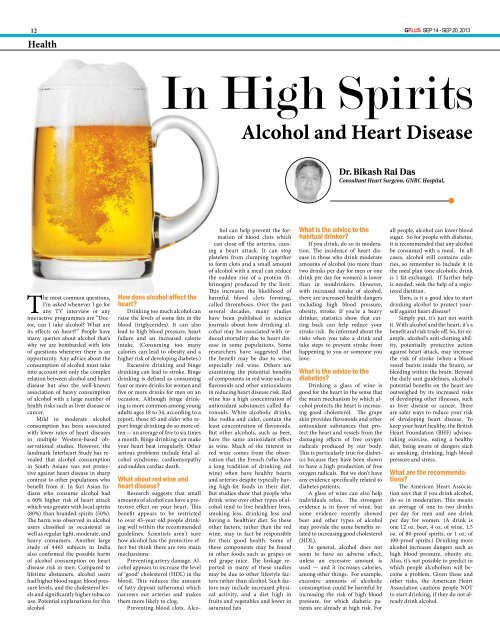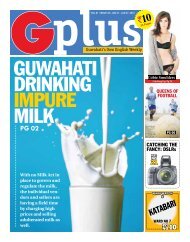Issue 12
You also want an ePaper? Increase the reach of your titles
YUMPU automatically turns print PDFs into web optimized ePapers that Google loves.
<strong>12</strong><br />
Health<br />
GPLUS SEP 14 - SEP 20, 2013<br />
In High Spirits<br />
Alcohol and Heart Disease<br />
Dr. Bikash Rai Das<br />
Consultant Heart Surgeon, GNRC Hospital,<br />
The most common questions,<br />
I’m asked whenever I go for<br />
any TV interview or any<br />
interactive programmes are “Doctor,<br />
can I take alcohol? What are<br />
its effects on heart?” People have<br />
many queries about alcohol that’s<br />
why we are bombarded with lots<br />
of questions whenever there is an<br />
opportunity. Any advice about the<br />
consumption of alcohol must take<br />
into account not only the complex<br />
relation between alcohol and heart<br />
disease but also the well-known<br />
association of heavy consumption<br />
of alcohol with a large number of<br />
health risks such as liver disease or<br />
cancer.<br />
Mild to moderate alcohol<br />
consumption has been associated<br />
with lower rates of heart diseases<br />
in multiple Western-based observational<br />
studies. However, the<br />
landmark Interheart Study has revealed<br />
that alcohol consumption<br />
in South Asians was not protective<br />
against heart disease in sharp<br />
contrast to other populations who<br />
benefit from it. In fact Asian Indians<br />
who consume alcohol had<br />
a 60% higher risk of heart attack<br />
which was greater with local spirits<br />
(80%) than branded spirits (50%).<br />
The harm was observed in alcohol<br />
users classified as occasional as<br />
well as regular light, moderate, and<br />
heavy consumers. Another large<br />
study of 4465 subjects in India<br />
also confirmed the possible harm<br />
of alcohol consumption on heart<br />
disease risk in men. Compared to<br />
lifetime abstainers, alcohol users<br />
had higher blood sugar, blood pressure<br />
levels, and the cholesterol levels<br />
and significantly higher tobacco<br />
use. Potential explanations for this<br />
alcohol<br />
How does alcohol affect the<br />
heart?<br />
Drinking too much alcohol can<br />
raise the levels of some fats in the<br />
blood (triglycerides). It can also<br />
lead to high blood pressure, heart<br />
failure and an increased calorie<br />
intake. (Consuming too many<br />
calories can lead to obesity and a<br />
higher risk of developing diabetes.)<br />
Excessive drinking and binge<br />
drinking can lead to stroke. Binge<br />
drinking is defined as consuming<br />
four or more drinks for women and<br />
five or more drinks for men on an<br />
occasion. Although binge drinking<br />
is more common among young<br />
adults ages 18 to 34, according to a<br />
report, those 65 and older who report<br />
binge drinking do so more often<br />
— an average of five to six times<br />
a month. Binge drinking can make<br />
your heart beat irregularly. Other<br />
serious problems include fetal alcohol<br />
syndrome, cardiomyopathy<br />
and sudden cardiac death.<br />
What about red wine and<br />
heart disease?<br />
Research suggests that small<br />
amounts of alcohol can have a protective<br />
effect on your heart. This<br />
benefit appears to be restricted<br />
to over 45-year old people drinking<br />
well within the recommended<br />
guidelines. Scientists aren’t sure<br />
how alcohol has the protective effect<br />
but think there are two main<br />
mechanisms:<br />
Preventing artery damage. Alcohol<br />
appears to increase the level<br />
of ‘good’ cholesterol (HDL) in the<br />
blood. This reduces the amount<br />
of fatty deposit (atheroma) which<br />
narrows our arteries and makes<br />
them more likely to clog.<br />
Preventing blood clots. Alcohol<br />
can help prevent the formation<br />
of blood clots which<br />
can close off the arteries, causing<br />
a heart attack. It can stop<br />
platelets from clumping together<br />
to form clots and a small amount<br />
of alcohol with a meal can reduce<br />
the sudden rise of a protein (fibrinogen)<br />
produced by the liver.<br />
This increases the likelihood of<br />
harmful blood clots forming,<br />
called thrombosis. Over the past<br />
several decades, many studies<br />
have been published in science<br />
journals about how drinking alcohol<br />
may be associated with reduced<br />
mortality due to heart disease<br />
in some populations. Some<br />
researchers have suggested that<br />
the benefit may be due to wine,<br />
especially red wine. Others are<br />
examining the potential benefits<br />
of components in red wine such as<br />
flavonoids and other antioxidants<br />
in reducing heart disease risk. Red<br />
wine has a high concentration of<br />
antioxidant substances called flavonoids.<br />
White alcoholic drinks,<br />
like vodka and cider, contain the<br />
least concentration of flavonoids.<br />
But other alcohols, such as beer,<br />
have the same antioxidant effect<br />
as wine. Much of the interest in<br />
red wine comes from the observation<br />
that the French (who have<br />
a long tradition of drinking red<br />
wine) often have healthy hearts<br />
and arteries despite typically having<br />
high-fat foods in their diet.<br />
But studies show that people who<br />
drink wine over other types of alcohol<br />
tend to live healthier lives,<br />
smoking less, drinking less and<br />
having a healthier diet. So these<br />
other factors, rather than the red<br />
wine, may in fact be responsible<br />
for their good health. Some of<br />
these components may be found<br />
in other foods such as grapes or<br />
red grape juice. The linkage reported<br />
in many of these studies<br />
may be due to other lifestyle factors<br />
rather than alcohol. Such factors<br />
may include increased physical<br />
activity, and a diet high in<br />
fruits and vegetables and lower in<br />
saturated fats<br />
What is the advice to the<br />
habitual drinker?<br />
If you drink, do so in moderation.<br />
The incidence of heart disease<br />
in those who drink moderate<br />
amounts of alcohol (no more than<br />
two drinks per day for men or one<br />
drink per day for women) is lower<br />
than in nondrinkers. However,<br />
with increased intake of alcohol,<br />
there are increased health dangers<br />
including high blood pressure,<br />
obesity, stroke. If you’re a heavy<br />
drinker, statistics show that cutting<br />
back can help reduce your<br />
stroke risk. Be informed about the<br />
risks when you take a drink and<br />
take steps to prevent stroke from<br />
happening to you or someone you<br />
love.<br />
What is the advice to the<br />
diabetics?<br />
Drinking a glass of wine is<br />
good for the heart in the sense that<br />
the main mechanism by which alcohol<br />
protects the heart is increasing<br />
good cholesterol. The grape<br />
skin provides flavonoids and other<br />
antioxidant substances that protect<br />
the heart and vessels from the<br />
damaging effects of free oxygen<br />
radicals produced by our body.<br />
This is particularly true for diabetics<br />
because they have been shown<br />
to have a high production of free<br />
oxygen radicals. But we don’t have<br />
any evidence specifically related to<br />
diabetes patients.<br />
A glass of wine can also help<br />
individuals relax. The strongest<br />
evidence is in favor of wine, but<br />
some evidence recently showed<br />
beer and other types of alcohol<br />
may provide the same benefits related<br />
to increasing good cholesterol<br />
(HDL).<br />
In general, alcohol does not<br />
seem to have an adverse effect,<br />
unless an excessive amount is<br />
used — and it increases calories,<br />
among other things. For example,<br />
excessive amounts of alcoholic<br />
consumption could be harmful by<br />
increasing the risk of high blood<br />
pressure, for which diabetic patients<br />
are already at high risk. For<br />
all people, alcohol can lower blood<br />
sugar. So for people with diabetes,<br />
it is recommended that any alcohol<br />
be consumed with a meal. In all<br />
cases, alcohol still contains calories,<br />
so remember to include it in<br />
the meal plan (one alcoholic drink<br />
is 1 fat exchange). If further help<br />
is needed, seek the help of a registered<br />
dietitian.<br />
Then, is it a good idea to start<br />
drinking alcohol to protect yourself<br />
against heart disease?<br />
Simply put, it’s just not worth<br />
it. With alcohol and the heart, it’s a<br />
benefit and risk trade off. So, for example,<br />
alcohol’s anti-clotting ability,<br />
potentially protective action<br />
against heart attack, may increase<br />
the risk of stroke (when a blood<br />
vessel bursts inside the brain), or<br />
bleeding within the brain. Beyond<br />
the daily unit guidelines, alcohol’s<br />
potential benefits on the heart are<br />
outweighed by its increased risks<br />
of developing other illnesses, such<br />
as liver disease or cancer. There<br />
are safer ways to reduce your risk<br />
of developing heart disease. To<br />
keep your heart healthy, the British<br />
Heart Foundation (BHF) advisestaking<br />
exercise, eating a healthy<br />
diet, being aware of dangers such<br />
as smoking, drinking, high blood<br />
pressure and stress.<br />
What are the recommendations?<br />
The American Heart Association<br />
says that if you drink alcohol,<br />
do so in moderation. This means<br />
an average of one to two drinks<br />
per day for men and one drink<br />
per day for women. (A drink is<br />
one <strong>12</strong> oz. beer, 4 oz. of wine, 1.5<br />
oz. of 80-proof spirits, or 1 oz. of<br />
100-proof spirits.) Drinking more<br />
alcohol increases dangers such as<br />
high blood pressure, obesity etc.<br />
Also, it’s not possible to predict in<br />
which people alcoholism will become<br />
a problem. Given these and<br />
other risks, the American Heart<br />
Association cautions people NOT<br />
to start drinking, if they do not already<br />
drink alcohol.

















